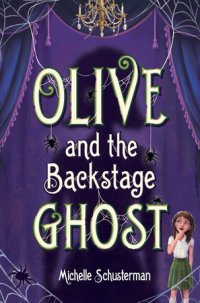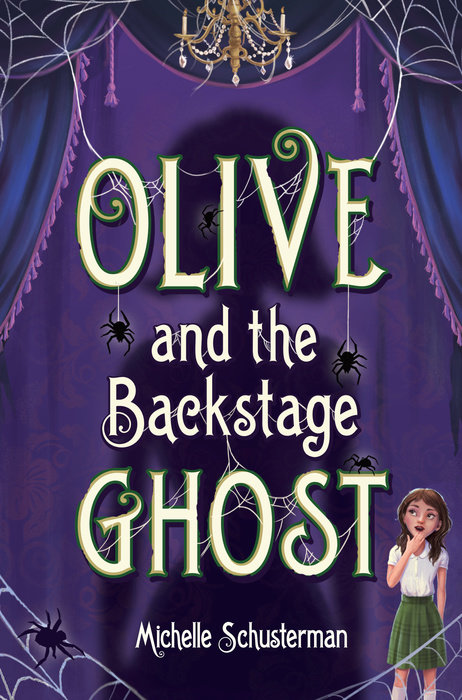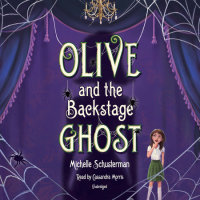Olive and the Backstage Ghost
A ghost story with a literary heart for fans of Neil Gaiman’s Coraline and The Graveyard Book. Theater kids and ghost-story readers alike will find new meaning in the term stage fright.
All great theaters have their ghosts. . . .
After Olive Preiss freezes during a theater camp audition, she flees in despair. She finds herself at Maudeville, a beautiful old theater that she’s never noticed before. She enters, goes onstage, and sings her song. “Thank you for that lovely audition, darling,” comes a voice from the shadows. “I believe I have just the part for you.”
Olive is thrilled to work with Maude Devore, the glamorous actress who owns the theater, and her eclectic cast of misfits. Yet gradually there are signs that Maudeville isn’t exactly what it seems. Sometimes—just for a moment!—it feels wrong. As opening day approaches, Olive’s doubts and fears grow. But no matter what, this show must go on . . . and on . . . and on. . . .
“Richly drawn . . . a haunting and ethereal tale.” —Booklist, Starred Review
An Excerpt fromOlive and the Backstage Ghost
1
Its Stubborn Heart
Olive Preiss thought of her city as a massive beast, and the theater district was its heart. Not a pretty heart you might doodle in a notebook, all curvy and neatly joined up at a point. More like the heart of a kraken--a raw mess of arteries and ventricles and veins clustered in the center, pumping tons of frenetic black energy through the monster.
So Olive didn’t draw neat, pretty hearts. She preferred them big and messy. Kraken hearts. One side might be bigger than the other, or the ends might cross with a violent slash. Sometimes her hearts looked like a hastily scrawled letter B, or a lopsided 3 with a tail. Olive used to attempt to be neat, but occasionally she practiced deliberate carelessness. Yet another imperfection for her mother to pick at.
She was doodling hearts on her music folder in the car one morning as her mother drove them to the city’s arts center. These hearts were more wibbly-wobbly than usual, thanks to Olive’s trembling hand. When the car made a sharp turn, the resulting heart looked more like a sloppy treble clef. Olive tucked her pencil back in the folder with a sigh.
Casting a furtive glance at Mrs. Preiss, she rolled her window down a tiny bit and inhaled deeply. Olive liked how the city smelled, because it smelled like everything good and bad--fried foods, cheap cologne, trash left out a day too long. Her mother said it stank, but Olive found it complex: a full range of disgusting to delicious.
“Olive.”
“Yes?”
“Where is your barrette?”
Olive’s hands flew up to her windblown hair, combing through short, dark tangles for the metal barrette. She plucked it out, wincing when a few strands ripped free. The car slowed to a stop at a light, and Mrs. Preiss turned to her daughter with a disapproving frown.
“Here.” She took the barrette and slid it into place, the metal scraping Olive’s scalp. “And close your window. The heat causes frizzies.”
Olive took her time, turning the window crank as slowly as possible.
“Do you have the forms?”
“Yes.” Olive patted her music folder, wondering why Mrs. Preiss had bothered to ask. She had, after all, tucked the arts center’s theater camp enrollment forms into Olive’s folder herself before they left.
“And the check?”
“Yes.” The slip of paper worth more than a month of bills was secured to Olive’s forms with a paper clip. Nonrefundable.
Mrs. Preiss cast a sharp glance at her. “How are you feeling?”
Anyone but Olive might miss the underlying threat in the question. She clasped her hands tightly. “Fine.”
“This audition is important, Olive,” Mrs. Preiss said, as if Olive weren’t acutely aware of this fact. “Theater camp isn’t worth the expense if you’re just going to be an understudy, like last summer. Talent scouts won’t be interested in anyone outside of the leading roles.”
Olive swallowed hard and said nothing. She had enjoyed being the understudy, truth be told. There had been no reason to worry about talent scouts. And most rehearsals weren’t darkened by her mother’s presence, so Olive had been free to lose herself in the performance in peace. But that was last year.
A lot could change in a year.
Her mother pressed on the gas pedal, tucking a straight brown lock behind her ear. No summer humidity would dare cause Laurel Preiss’s hair to frizz. “It’s time to conquer this ridiculous . . . stage fright.”
Stage fright. She said it with a sneer, the same contemptuous tone she reserved for words like beggars and thrift stores. Olive traced a messy heart on the window with her finger. She did not have stage fright.
“I know” was all she said.
“You love singing, Olive.”
This was very true.
“You want to perform.”
Also true.
“Most children don’t have the opportunities you have. Especially these days.” Mrs. Preiss squeezed the steering wheel, her knuckles whitening. “You can’t let fear of the spotlight stop you.”
I’m not afraid of the spotlight. Olive bit her lip and stared through the glass at a bus stop, where colorful new advertisements for the latest musicals and plays covered the outside of the shelter. The city may have been struggling to survive in the last few years, weakened by hard times, constantly on the verge of collapse. But its stubborn heart beat on.
Squinting, Olive scanned the names of the theaters. She’d heard of only a few, but that wasn’t unusual. It was next to impossible to know all the venues in the city, and not just because of sheer number. The theaters were in constant flux, moving and changing, opening and closing. It was a feverish, never-ending search for the next big show, the next big star.
Olive dreamed about being that star. If it hadn’t been for her mother, she might even have dared to believe it was possible.
2
Mother Fright
When Olive was eight, she’d spent months practicing for her first music recital. She still grew warm at the memory of the stage lights overhead, sweat blurring her vision as she listened, detached, while her own voice turned to an unrecognizable warble. The whir and flash of her father’s camera in the otherwise silent crowd. Her mother’s fierce gaze, more scalding than the lights.
Just a little case of stage fright, her teacher had said reassuringly. Normal for your first recital. It’ll get easier. And that might have been true if Olive weren’t the daughter of one of the city’s most beloved stars.
Mrs. Preiss had been discovered by a talent scout at age ten and enjoyed a few wildly successful decades on the city’s most prestigious stages. Olive had vague memories of attending those shows, of watching in awe as her mother became someone else, someone with a story to tell, someone who could render an audience breathless. She vividly remembered her mother’s final show, when years of belting it out finally took its toll on her voice. The strained, off-key performance was sensational in the worst possible way, an undignified end to an otherwise magnificent career.
Humiliated, Laurel had turned her attention to her daughter’s career instead. After Olive’s disastrous recital, Laurel took control of everything, booking auditions, preparing recital material, maintaining a careful practice regimen. Everything Olive did was under constant scrutiny, and for most of her life, she’d tried her hardest to win her mother’s approval. A word or two of praise, and Olive would glow--but criticism always followed, like a bucket of icy water.
Eventually, Olive had come to realize that her mother wasn’t trying to help her become the best singer she could be. She was trying to re-create her own career, but with a happier ending.
Olive did want to perform. But as herself, not as a mistake to be corrected. Which was why, in a small act of rebellion, Olive had chosen her own secret audition music. It was a song Laurel disapproved of and, therefore, Olive adored. In the final weeks of school, she’d caught herself humming the tune during classes; tangling the lyrics up with sonnet couplets in English; solving for x and getting B-flat in math. She practiced it whenever she was alone: in the tub; in her bed; on the balcony, where her voice was lost to the sounds of traffic below. She thought she was quite good, in all honesty. But practicing Mrs. Preiss’s music was another story. There was no joy in singing if she was involved.
Olive did not have stage fright. It was more like mother fright.
Today, though, would be different. Because of the sheer number of children auditioning, family and friends were not allowed to watch the process. Olive felt a shiver of anticipation at the idea of standing on a stage and singing her own song, free from her mother’s critical gaze. She could land a good role--maybe even a leading role.
She exhaled shakily as Mrs. Preiss swung the car into a parking space. Stepping outside, Olive closed her door and patted her hair self-consciously. Hello, frizzies. The thick, humid air filled her mouth and coated her throat like the bland lentil soup that had been last night’s dinner.
Olive and her mother entered the lobby and joined the line of parents and children at the registration desk. Olive kept her eyes downcast, doing her best to ignore all the excited chatter. If anyone had tried to strike up a friendly conversation with her at that moment, they just might walk away with lentil soup on their sandals.
At the desk, Olive pulled her enrollment forms and piano sheet music out of her folder. Mrs. Preiss took them, lips pursed tight as she unclipped the check and handed it to a smiling woman. She squinted down at the forms, then up at Mrs. Preiss, and her face brightened.
“Preiss! Oh my goodness, you’re Laurel Preiss, aren’t you? The Laurel Preiss? My Dearest Bernice was the very first musical I ever saw--you were just incredible!”
Olive’s mother forced a smile. “Thank you, that’s very kind.”
“Of course, you were Laurel Bernstein then,” the woman continued chattering as she stamped and filed the forms. “You were, what, eleven or twelve years old? So incredible. And your daughter’s auditioning for our little camp? How exciting! I bet your fa--”
The woman’s face tightened for just a moment, and Olive looked down. She hated seeing the look on others’ faces when they remembered what had happened to her father, and she silently prayed the topic would not come up.
“Well, anyway,” the woman said, clearly flustered. “Good luck, sweetie--although I’m sure Laurel Preiss’s daughter doesn’t need luck.”
She handed Olive a tag with an audition number--eighty--and pointed them to the backstage entrance down the corridor and to the right. Olive squeezed the tag, itching to get away from her mother. She hoped she could make it through the audition without everyone finding out she was Laurel Preiss’s daughter. If Olive did well, she wanted to know it was due to her own talent.
“I know parents aren’t allowed to watch the auditions,” Mrs. Preiss said crisply. “But I was wondering if you might make an exception for me.” Olive’s head snapped up, dread seeping into her stomach like cement.
The woman’s eyes widened. “Oh, of course!” She glanced around, then lowered her voice to a conspiratorial whisper. “Come back here after you take your daughter backstage, and I’ll sneak you in.” She winked, clearly pleased with herself, and was rewarded with another thin-lipped smile.
“Thank you.”
Mrs. Preiss took Olive’s arm and led her down the hall before the woman could gush any further. Olive was in shock. Months of preparation, wasted. Now she couldn’t sing her song. She had to sing the one her mother had chosen, the way she had taught Olive to sing it. As always.
Years ago, Olive had found the clipping of a musical review published the year before she was born, tucked away in her mother’s makeup drawer.
With her striking beauty and powerful voice, it’s no surprise Laurel Preiss steals our hearts with every leading role she takes on. But there are moments when we catch a glimpse of something else--a coy look with a hint of menace; sweet words laced with a steely edge--and we can’t help but wonder if her talents might be better harnessed in a different role. As enchanting as her heroines are, imagine the delicious wickedness Laurel Preiss might unleash as a villain.
Olive had once been naïve enough to laugh at the very idea.
They stopped at the backstage entrance, and Mrs. Preiss turned to her daughter with hypercritical eyes.
“Smile,” she said sharply, adjusting Olive’s barrette again. “No, wider. There. If you walk out on that stage with a droopy face, your audition will be over before it begins.”
Olive nodded, her cheeks already aching.
“We should have gone with the blue dress,” Mrs. Preiss murmured, pinning the audition tag to Olive’s blouse. “This outfit’s a bit too . . . conservative.” She glanced at Olive’s face, eyes narrowing. “You look pale. Are you feeling sick again?”
“No,” Olive lied. A pounding had begun behind her temples.
Pulling the backstage door open, Mrs. Preiss gestured for Olive to enter. “I’ll be waiting in the lobby afterward. And, Olive?”
“Yes?” Once upon a time, this was the moment her mother would soften just a bit. A quick kiss on the forehead, or a small smile and a whispered You’ll be fine. Olive stared up at her mother, a tiny ember of hope sparking in her chest.
“Check your posture. You’ve been slouching lately.”
The ember fizzled out with a hiss.
Squaring her shoulders, Olive nodded and smiled wide, wide, wide. She waited until the door clicked closed before sticking her tongue out.
She wanted to scream, or kick something, or cry in frustration. But dozens of children huddled in clusters backstage, and several more were scattered around, mouthing lyrics or singing warm-ups. So Olive stuck to the wall near a rack of costumes, scanning each face and trying to breathe normally. She didn’t recognize anyone from school, which was good. Interacting with other children came with its own kind of performance anxiety these days.
It hadn’t always been this way. Elementary school was simple enough: Olive had friends to play hopscotch with at recess, and one or two “enemies” who poked fun at the contents of her packed lunch. But her first year of middle school had been different. Olive no longer had friends or enemies. She didn’t want either. She simply existed, a ghost of a girl moving from class to class.
She moved that way now, slipping around the costume rack, avoiding eye contact with anyone who looked overly friendly. She peered through the curtains and saw a teenage boy standing center stage. A few adults sat in the front row, and Olive immediately recognized a red-haired woman as the theater camp director from her photo in the brochure. Children who had already auditioned were laughing and chatting in groups throughout the auditorium. Olive imagined her mother in the crowd, and her stomach clenched.
“Number fifty-two, Ernie Smith . . . ready?”
The boy gave a little salute, and the director smiled. She gestured to the pianist in the orchestra pit, a young man with heavy-lidded eyes who looked as though he needed a few extra hours of sleep. As the opening chords sounded, Olive backed away from the curtains. She hurried to a quiet, dark corner and sank to the floor next to an oversize wardrobe. A prop, she thought distantly, tracing a finger over the painted wood. She decided to distract herself by focusing on the show rather than the audition and her mother’s presence.
Olive loved that moment when the house lights dimmed and the curtain rose and the audience saw not actors in costumes surrounded by set pieces, but living, breathing characters in a whole different world. She wanted desperately to be a part of that. To walk onto a stage and become someone else entirely. But how could she become someone else, someone better, when her mother was always there to point out her flaws?


